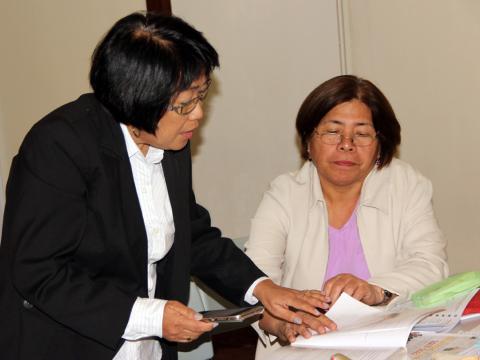Regional Training Center VII director Carolyn May Daquio and assistant director Gracia Arado (in black) review the agency’s corporate plan. (photo by Daniel Nilo)
DILIMAN, Quezon City—To improve the Quality Management System of the organization, key officials of the Agricultural Training Institute (ATI) convened for the 2019 Quality Objectives and Risk Assessment Planning Workshop based on the requirements of ISO 9001:2015.
The activity gave way to the formulation of the 2019 Quality Objectives, finalization of the 2019 Risk Assessment Plan, and resolution of the issues that resulted from the audit findings since last year.
Quality Objectives are the main method used by organizations to focus the goals from the Quality Policy into plans for improvement. The Quality Policy, on the other hand, is developed based on the customer’s requirements.
ISO expert Engr. Paul Mondoñedo served as the resource person of the workshop. He defined risk as an uncertainty of an occurring event that could have an impact on the achievement of the organization’s objectives.
Risk assessment, he said, is the process of prioritizing which issues have a bigger impact to the organization’s goals and strategies and which actions can reduce the impact of the issues. He discussed the risk management cycle which involves establishing the context, risk assessment, risk treatment, monitoring and review, and communication and consultation.
Mondoñedo also talked about ISO 9001 standards in terms of understanding the organization and its context; understanding the needs and expectations of interested parties; actions to address risks and opportunities, among others.
A group session was held to identify internal and external issues based on the organizational context as indicated on the ATI’s Corporate Plan for 2017-2022. The participants also determined the needs and expectations of the interested parties based on these issues.
Mondoñedo also guided the participants in risk assessment by reviewing what the vision, mission, quality policy, and guiding principles and values of an organization should be.
“This activity is very important for the harmonization of practices among the Central Office and training centers. I hope this will not be the last. I especially look forward to having a quarterly assessment in all ATI offices,” Regional Training Center XII director Abdul Daya-an commented after the workshop.
A total of 54 participants attended the event. In attendance were the ATI director, division chiefs, and section chiefs from the central office as well as the training center directors, planning officers, and other representatives from the 16 training centers nationwide. This was held on January 21-22, 2019 at the Rural Development and Education Center in this city.

